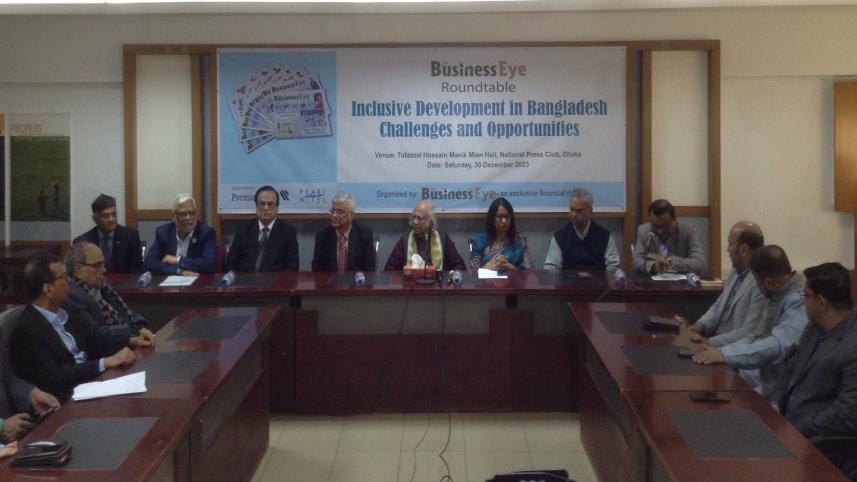Rising wealth disparity, graft stand in the way of inclusive economy

The growing wealth disparity and corruption in Bangladesh are among the biggest challenges for creating an inclusive economy in the country, according to various economists.
"Although poverty has decreased, income inequality has widened over the years and this is a major problem for our economy," said Jahangir Alam, an agricultural economist.
He was speaking at a roundtable on "Inclusive Development in Bangladesh: Challenges and Opportunities", organised by Business Eye, a financial daily, at the Jatiya Press Club in Dhaka yesterday.
Citing data of the Bangladesh Bureau of Statistics, Alam said it is worrying that the country's Gini coefficient currently stands at 0.499 while it was 0.458 in 2010.
The Gini coefficient, or Gini index, is a measure of income inequality within an economy.
It is expressed as a number between 0 and 1, where 0 represents perfect equality (everyone has the same income) while 1 represents maximal inequality (one person has all the income).
With this backdrop, Alam said the growing wealth disparity is to blame for rising income inequality.
"While there is no issue regarding the economic growth we have achieved or will achieve, it is important to question the characteristics of our development," he added.
Regarding ways to decrease the wealth disparity, Alam urged for addressing income, educational and employment inequalities between rural and urban regions.
He also said social safety nets need to be expanded while corruption should be rooted out.
"The triangle of power among unscrupulous businessmen, politicians and bureaucrats must be broken," Alam added.
Dr Shamsul Alam, former state minister for planning, said Bangladesh's economy has transformed over the years, experiencing massive growth in the process.
"But when a country sees such development, there is also a rise in wealth disparity," he added.
Highlighting various government initiatives to reduce wealth gaps, he said it has become a challenging task due to corruption.
Noted economist Qazi Kholiquzzaman Ahmad said inclusive development is a part of Bangladesh's heritage as it is rooted in the country's spirit of liberation.
"But a great erosion of values remains as we want more wealth and power. We have to get out of this mindset. Our principles are fine, but when it comes to the individual level, our values have been greatly eroded," he added.
He also said the issue of inclusive development was incorporated in the country's policy framework.
"Bangabandhu [Sheikh Mujibur Rahman] did this. He wanted to reduce people's suffering. Therefore, whatever development measures we take, we have to think of those who are marginalised," he added.
Ahmad said alongside Covid-19 and the Russia-Ukraine war, some missteps by the authorities concerned have worsened the challenges related to ongoing inflation, the US dollar crisis and corruption.
"These [challenges] have to be dealt with," he added.
Faruque Hassan, president of the Bangladesh Garment Manufacturers and Exporters Association, said the economy is on the right track but there are some issues that require attention.
For example, the implementation of mega projects needs to be sped up and existing barriers for doing business should be removed, he added.
Md Amin Helali, senior vice-president of the Federation of Bangladesh Chambers of Commerce and Industry, said the country should reduce its reliance on the garments sector for earning foreign currency to ensure sustainable growth.
Atiur Rahman, former governor of Bangladesh Bank, and Farida Yasmin, editor of Business Eye, also spoke at the event.



 For all latest news, follow The Daily Star's Google News channel.
For all latest news, follow The Daily Star's Google News channel.
Comments